Simon Counsell responds to an interview from the forest certification group. FSC interview
On April 7th, Mongabay printed an interview with FSC International Communications Manager, Nina Haase, in which she defended the FSC against criticism leveled at it by various environmental organizations, such as The World Rainforest Movement and Ecological Internet. The interview drew strong reactions on both sides, and Simon Counsell, director of the Rainforest Foundation UK, requested a chance to respond to the FSC’s interview in-depth. In his response, he states that the FSC has created a “‘race to the bottom’ of certification standards”, alleging that the “FSC really has become the ‘Enron of forestry'”.
Counsell, a Founder Member of the FSC, has been monitoring the organization since its creation in 1993. The problems with the FSC are not new says Counsell: “Not long into the FSC’s existence, we started to hear worrying reports… In some cases, certificates were being issued to companies that had a very poor environmental and social record. In 2000, we commissioned a series of local and international experts to investigate and write up a series of case studies about such problems from a number of countries. The results were alarming, and we realised that these were not just isolated cases of ‘bad’ certificates, but the result of systemic problems within the FSC.”
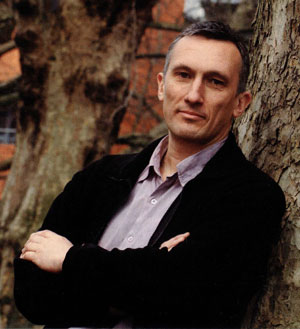
Simon Counsell. Photo by Third Sector Magazine |
Counsell believes that many of the FSC’s drawbacks are due to its tendency to look at each individual logging operation as a separate entity while ignoring the big picture of what industrial logging is doing to rainforest ecology. “Whilst a logging concession might appear to be ‘sustainable’ at this small-scale level, the whole development model that accompanies industrial logging concessions might be highly non-sustainable and destructive,” Counsell says. He continues with examples from the Amazon and Indonesia: “Research in the Amazon has shown that, over a period of years, commercial logging greatly increases the overall propensity of the forest to dry out, burn, and disappear. This happens regardless of whether the logged areas are certified or not. In Indonesia, local environmentalists and indigenous rights experts have long said that it is no use just certifying the odd ‘exemplar’ logging company here and there, because the whole system of industrial logging concessions needs dismantling, and that most of the forest should be returned to its rightful owners, the indigenous communities.”
Another problem that Counsell sees as detrimental to the credibility of the FSC is their certification of products from ‘mixed sources’, which “allows up to 90% of the wood fibre in some FSC-labeled products to come from forests or plantations that are not actually FSC-certified, but are supposedly ‘controlled sources’. The truth is that these sources are not ‘controlled’ at all – and hence many FSC products are likely to include material that is from illegal operations, or felling in High Conservation Value forests, or areas that are claimed by indigenous people. The Mixed Sources policy is allowing the laundering of unacceptable wood into the FSC system.”
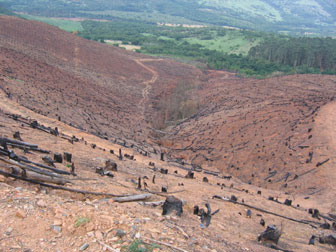
FSC certified plantation in South Africa run by Sappi, one of the world’s biggest plantation and pulp companies. Photo by Chris Lang |
Furthermore, Counsell sees FSC’s claim that they make forests economically viable through piecemeal old-growth logging and monoculture plantations as simply erroneous. The FSC argues that by making parts of the forest worth something economically it stops the forest from destruction due to illegal logging, agriculture, or ranching, in other words harvesting a part of the forest saves the rest of it. Counsell disagrees: “The old ‘use it or lose it’ argument about forests has long been favoured by the forest industry. The problem is that almost nowhere does it seem to be true. At least in the tropics, many decades of experience with the timber industry has been that what really happens is to ‘use it AND lose it’. Industrial-scale logging in tropical rainforests, because it is mostly inherently ecologically unsustainable, is almost always succeeded by complete clearance of the land.”
In the interview, Counsell responds directly to several claims made by the FSC. He states that there been several records of the FSC selling illegally logged wood and that the FSC has caused more harm than good to indigenous groups: “I am aware of cases where there has been serious abuse of indigenous peoples’ rights in FSC certified areas”. In regards to FSC’s claim that their monoculture plantations do not replace forest, Counsell responded: “In truth, many of the areas that are now FSC-certified plantations were formerly natural forests. Also, FSC-certified plantations have destroyed many other important non-forest natural ecosystems, ranging from grasslands in South Africa to peat-bogs in Ireland.”
In her interview, Ms. Haase laid out several methods through which NGOs can raise concerns about FSC certifications. Counsell, having gone through such processes in the past, states that the structure is unwieldy, time-consuming, and in the end changes nothing. “In the late 1990s, the Rainforest Foundation worked with Indonesian NGOs to bring a formal complaint to the FSC about a certificate that had been awarded to a company logging in the rainforests of Sumatra.” Counsell says. “We had much evidence, verified by on-the ground inspection and detailed in reports and video, that there were many problems with the company, including illegal timber felling, and conflicts with local communities. The complaint took four years to go through the FSC process — and only then resulted in the FSC agreeing to do more monitoring. It remains certified.”
Counsell acknowledges that as of now the FSC is only certifying body for ‘sustainable’ forestry, but says that “being the best of a bad bunch is not much of an accolade,” adding that “the most important point is that wood buyers cannot trust it anymore, however much better it is than the other schemes.”
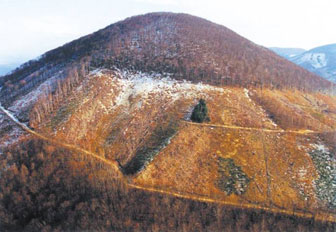
This picture from Slovakia shows one of the operations of the state forestry company, which has had several of its regions certified. This actually illustrates one of the main points in the interview very well, because this was originally certifed by the Soil Association, but then lost its certificate because of poor management practices, but they then went to another certifier, SGS, and got re-certified. Photo by Maria Hudakova, WOLF/Friends of the Earth Slovakia. |
To gain back its credibility, Counsell suggests that the FSC “needs to break the direct economic link between the certifiers and the loggers that want to get certified. It needs to enact much stricter sanctions against certifiers that break the rules…It needs to make the certifiers compete for certification contracts on the basis of carrying out assessments to the highest technical standards. It needs to immediately ban the issuing of certificates where there is no local forestry standard that has been agreed by local stakeholders. It needs to cancel certificates that were issued to companies that do not comply with the FSC’s Principles and Criteria of good forest management.”
Simon Counsell has different advice for consumers. Rather than encouraging consumers to pursue the FSC stamp at this time, Counsell would rather see consumers lessen their use of forestry products altogether: “Use less forest products wherever possible. Choose recycled or re-used products…Buy products that come from countries where the forestry standards are higher and enforced in law”. Extending this idea to the global market, Counsell believes that the best way to stop the logging of rainforests is to halt the over-consumption of wood products by restricting their availability. “What is needed is closer government regulation of how forests are used. If the supply of wood products is restricted, prices will increase, and society will find it has less appetite for wasting this valuable resource as it currently does.”
In the following April 2008 interview, Simon Counsell discusses systematic problems that he sees in the FSC, and the ways in which the certification body should improve itself to regain its credibility with both environmental groups and consumers.
AS A SOURCE ON THE FSC
Mongabay.com: How long has your organization, Rainforest Foundation UK, been monitoring the decisions of the FSC?
Simon Counsell: I personally was involved with forest certification initiatives since before the FSC was established, and was a member of the ‘Certification Working Group’ which was a precursor to the FSC and laid some of the groundwork for it. I was then one of the Founder Members of the FSC, and have been following it ever since its establishment in 1993. I was very much involved in the UK National FSC initiative, including making a contribution towards development of the UK national FSC standards.
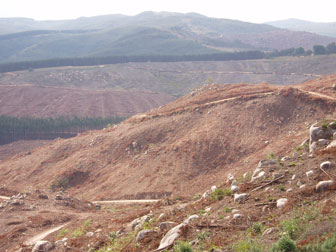
FSC certified plantation in South Africa run by Sappi, one of the world’s biggest plantation and pulp companies. Photo by Chris Lang |
But not long into the FSC’s existence, we started to hear worrying reports, including from some of Rainforest Foundation’s many local partner organisations in tropical countries, about problems with FSC certified forestry companies. In some cases, certificates were being issued to companies that had a very poor environmental and social record. In 2000, we commissioned a series of local and international experts to investigate and write up a series of case studies about such problems from a number of countries. The results were alarming, and we realised that these were not just isolated cases of ‘bad’ certificates, but the result of systemic problems within the FSC.
We showed our results to the Board and Director of the FSC in mid-2002. They thanked us for our work – and did nothing. We then published the detailed results, along with our recommendations for improving the FSC’s reliability, in the report ‘Trading in Credibility’, of which we gave a copy to every FSC member that attended the 2002 General Assembly.
The analysis in Trading in Credibility is, I think, as true now as it was then. If anything, things have probably got worse, and the FSC’s so-called accredited certifiers are even more out of control now than they have ever been.
ON THE FSC’S CERTIFYING MONOCULTURE PLANTATIONS
Mongabay.com: Do you agree with the recent critics of the FSC, namely Ecological Internet’s criticism of the FSC for its support of old-growth logging and the World Rainforest Movement’s criticism regarding the certification of Veracel’s plantations?
Simon Counsell: One of the problems that became evident through our research in 2000-02 is that the FSC only considers the quality of wood production at the level of the ‘forest management unit’ — that usually means the individual logging company, or sometimes even just part of a company’s operations. The problem about this is that, whilst a logging concession might appear to be ‘sustainable’ at this small-scale level, the whole development model that accompanies industrial logging concessions might be highly non-sustainable and destructive.
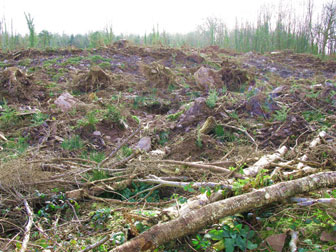
Clearcut at Raheen wood, Ireland. Photo by Wally Menne. |
So, for example, research in the Amazon has shown that, over a period of years, commercial logging greatly increases the overall propensity of the forest to dry out, burn, and disappear. This happens regardless of whether the logged areas are certified or not. Even certified forests cause landscape-level fragmentation of the forest, which reduces habitat value for wildlife.
In Indonesia, local environmentalists and indigenous rights experts have long said that it is no use just certifying the odd ‘exemplar’ logging company here and there, because the whole system of industrial logging concessions needs dismantling, and that most of the forest should be returned to its rightful owners, the indigenous communities. So, in these cases, FSC is serving to legitimise an approach to ‘forest management’ that is fundamentally flawed.
Concerning plantations, the problem is that FSC has failed to recognise that most of what it is certifying is a travesty of the notion of forests. They have no biodiversity, no social or cultural values, and often provide little in the way of environmental services — that is, they lack most of the key characteristics of ‘forests’, and should be more rightly described as outdoor fibre factories. Whether it is the role of an organisation with the word ‘Forest’ in its name to issue ‘eco-certificates’ to such places, I have serious doubts.
Mongabay.com: FSC has stated that the monoculture plantations they certify do not replace natural forest. Is this true?
Simon Counsell: The FSC has a rule that plantations cannot be certified if they were established on recently deforested land. But in truth, many of the areas that are now FSC-certified plantations were formerly natural forests. Also, FSC-certified plantations have destroyed many other important non-forest natural ecosystems, ranging from grasslands in South Africa to peat-bogs in Ireland.
Mongabay.com: How do you respond to this statement from our interview with the FSC: “Many of FSC certified plantations actually contribute to the restoration of natural forests, by either allowing or actively promoting regeneration of natural forests in sensitive areas such as riparian zones”?
Simon Counsell: As with much of what the FSC claims in its defence to criticism, this seems to be more wishful thinking that empirically demonstrable fact. I have never seen any good evidence to support such a claim.
THE ECONOMICS OF THE FSC
Mongabay.com: What do you say to FSC’s argument that certifying old-growth logging and monoculture plantations are necessary to make forests worth something on the global market, thereby saving forests from wholesale destruction by illegal logging?
Simon Counsell: The old ‘use it or lose it’ argument about forests has long been favoured by the forest industry. The problem is that almost nowhere does it seem to be true. At least in the tropics, many decades of experience with the timber industry has been that what really happens is to ‘use it AND lose it’. Industrial-scale logging in tropical rainforests, because it is mostly inherently ecologically unsustainable, is almost always succeeded by complete clearance of the land. The only areas of tropical rainforest that have been able to endure in the longer term have been those such as protected indigenous areas where the value of the forest has been effectively reduced to nil, by banning most forms of exploitation.
Mongabay.com: If not through the FSC, how should the global market deal with a growing demand for wood products?
Simon Counsell: The fact is that constantly increasing wood consumption is not consistent with conservation of the wider values of forests, such as for biodiversity, cultural uses or ecosystem services. The market probably cannot deal with the problem of over-consumption. What is needed is closer government regulation of how forests are used. If the supply of wood products is restricted, prices will increase, and society will find it has less appetite for wasting this valuable resource as it currently does.
THE FSC AND CLIMATE CHANGE
Mongabay.com: Currently, the FSC has no rules or regulations for certification regarding climate change and the importance of tropical forests as carbon sinks. Should the FSC be taking climate change in consideration when certifying?
Simon Counsell: At present, the FSC cannot reliably guarantee the ‘sustainability’ even of large, bulky, tangible goods such as logs and lumber. It has a poor record even of detecting gross illegalities in logging operations. This does not inspire confidence that its accredited certifiers could be trusted with the technically much more difficult task of assessing forest carbon flows, which even highly qualified scientists are still struggling with.
FSC should concentrate on trying to get its core operations sorted out before venturing into carbon assessment.
Mongabay.com: Do you believe that FSC certified companies are currently contributing to global warming?
Simon Counsell: The evidence suggests that logging in tropical rainforests directly causes a net release of carbon to the atmosphere. This is true for both certified and non-certified logging companies. Where certified logging companies are causing the long term desiccation of forests and increasing their susceptibility to fire, the indirect climatic impact of these companies could be very substantial.
In some cases, where FSC has certified poorly designed and badly managed plantations, there is a large risk of fire and release of CO2. One FSC-certified plantation in Swaziland that went up in smoke last year alone would have released several hundred thousands of tonnes of CO2 to the atmosphere. I am not sure whether this means that the CO2 from this vaporised plantation is FSC certified!
THE FSC’S MONITORING SYSTEM
Mongabay.com: In your knowledge, has the FSC ever certified wood products that were traced back to illegal logging?
Simon Counsell: On several occasions. Details of this can be found on FSC-watch.org.
Mongabay.com: How adept is the FSC at monitoring the company’s products once they have been certified?
Simon Counsell: There appear to have been many irregularities in FSC’s Chain of Custody system. For its faults, FSC’s process of certifying forest management is relatively transparent, and the certifiers have to produce publicly available reports on what they have certified. But for Chain of Custody certification of products once they have left the forest, the certifiers do not have to produce reports, so it is very difficult to assess whether they have been properly assessed or not. Similarly, it is not easy to check whether FSC is properly controlling the Chains of Custody, because the FSC’s reports aren’t available either.
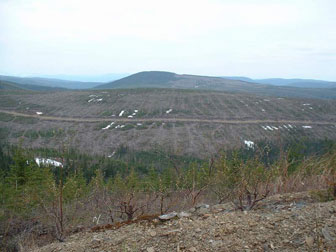
This picture of Temrex, Canada shows massive clear-fell operations. It is impossible to see how this could have complied with FSC’s requirements. Photo by David Nickarz |
I have heard a growing number of concerns from within the timber industry about fraudulent use of the FSC’s logo on wood products. A particularly problematic area is China, where the FSC is struggling to prevent fraud. But the problem is likely to be widespread. The result of this is that timber buyers really can’t be sure whether the FSC-labeled wood that they are buying is genuinely from an ‘environmentally acceptable, socially beneficial and economically sustainable’ source.
Mongabay.com: In your experience, if a company is found to not comply with FSC requirements, does the FSC stand firm in making certain the company complies, and if not, removes away their certification?
Simon Counsell: No. FSC’s own reports show that it is aware that the certification bodies, such as SGS, are issuing certificates to forestry companies that do not comply with the FSC’s requirements — but they are allowing the certifiers to carry on doing this anyway. In reality, the FSC seems to have little power to stop such practices. The certifiers now know that they can continue with impunity to earn their certification fees even when they issue FSC certificates to companies that are egregiously breaching the FSC’s rules.
ON AN NGOS ABILITY TO WORK WITH THE FSC
Mongabay.com: As a organization, have you ever attempted to go through the steps outlined by the FSC to point out certifying decisions that you felt were misguided (like those pointed out by Ms. Haase in her interview)?
Simon Counsell: In the late 1990s, the Rainforest Foundation worked with Indonesian NGOs to bring a formal complaint to the FSC about a certificate that had been awarded to a company logging in the rainforests of Sumatra. We had much evidence, verified by on-the ground inspection and detailed in reports and video, that there were many problems with the company, including illegal timber felling, and conflicts with local communities. The complaint took four years to go through the FSC process — and only then resulted in the FSC agreeing to do more monitoring. It remains certified.
There is no way that most NGOs, especially in developing countries, could sustain such a long and expensive complaint process. The process is heavily stacked in favour of the certifiers and their forestry clients. The FSC has never, to my knowledge, cancelled a certificate as a result of a complaint (though this is hard to know for sure, because the FSC keeps secret most information about cancelled certificates). There is supposed to be a new simpler complaints process, but the rules of it have not yet been made known to FSC’s members!
Mongabay.com: Does the FSC listen to some NGOs more than others regarding complaints and concerns?
Simon Counsell: I don’t get the impression that FSC listens to NGOs much at all. Some NGOs such as WWF and Greenpeace probably could have much more influence than they actually do at the moment.
Mongabay.com: In our interview with the FSC, they stated that they have a “transparent and inclusive system set up so that everybody interested in improving the management of the world’s forests can participate and contribute.” As an NGO have you found this to be true?
Simon Counsell: The evidence suggests otherwise. The most ‘inclusive’ part of FSC’s decisions-making process should be the tri-annual General Assembly of its members. But decisions taken by the members are routinely ignored or deferred indefinitely.
For example, in 2002, the members agreed that the FSC should start phasing out the issuing of certificates in countries where there is no FSC forestry standard that has been agreed by local stakeholders. Six years later, and such certificates are still being issued, and now constitute the vast majority of FSC’s total number of certificates. This is seriously ‘non-inclusive’ of both FSC’s members and local stakeholders.
DOES THE FSC BENEFIT INDIGENOUS PEOPLES
Mongabay.com: How do you view the FSC’s effectiveness in protecting the rights of indigenous peoples?

Kayapo tribesmen in Brazil. Photo by Simon Counsell |
Simon Counsell: There is very little evidence yet that FSC provides any benefits for indigenous people. I am aware of cases where there has been serious abuse of indigenous peoples’ rights in FSC certified areas.
Mongabay.com: You’ve worked with a lot of indigenous groups in South America and Africa, what is the general view of the FSC among such groups?
Simon Counsell: Like many environmentalists, many indigenous groups started off being fairly optimistic about the FSC as, under the right circumstances, it did provide for the first time, a chance for dialogue with forest managers. But I think there has been growing disillusionment, as the FSC has shown itself often to be very weak in protecting indigenous peoples’ rights. As with environmental groups, indigenous organisations have no doubt found it difficult to sustain the very high levels of time and effort required to ‘stay in the game’, especially when FSC has constantly been changing its rules and policies. For this reason, the interests of industry in the FSC have become progressively more dominant over the years.
THE CREDIBILITY OF THE FSC AND ITS FUTURE
Mongabay.com: On the RFUK website it states that “some of the FSC’s rules have allowed for easy abuse of the certification process.” Which rules are these? How would you like to see the FSC to change them?
Simon Counsell: One of the FSC’s biggest mistake has been with the ‘Mixed Sources’ labeling policy. This allows up to 90% of the wood fibre in some FSC-labeled products to come from forests or plantations that are not actually FSC-certified, but are supposedly ‘controlled sources’. The truth is that these sources are not ‘controlled’ at all – and hence many FSC products are likely to include material that is from illegal operations, or felling in High Conservation Value forests, or areas that are claimed by indigenous people.
The Mixed Sources policy is allowing the laundering of unacceptable wood into the FSC system. The policy needs to be completely re-thought. If this doesn’t happen soon, it is likely that the FSC will be challenged under consumer protection legislation, for misleading purchasers.
Mongabay.com: Are the current issues in the FSC isolated incidents or a part of systemic and longterm problems?
Simon Counsell: There are now so many well-documented examples of bad FSC certificates that one has to conclude that these are due to major systemic flaws in the FSC system. One of the most important of these is that companies wanting to get certified directly contract with and pay the certification companies to assess them and issue certificates. This means that the certifiers have a vested economic interest to issue certificates, even when their ‘clients’ do not deserve them.
Because the numerous accredited FSC certifiers are all competing with each other for business, there is, I believe, a ‘race to the bottom’ of certification standards going on, with the certifiers all trying to be more ‘generous’ than their competitors to capture more certification business. FSC really has become the ‘Enron of forestry’.
Mongabay.com: Are there other certifying bodies that you believe are more reliable than the FSC?
Simon Counsell: No, for all its faults, the FSC is still probably the best — but being the best of a bad bunch is not much of an accolade. And the most important point is that wood buyers cannot trust it anymore, however much better it is than the other schemes.
Mongabay.com: How can the FSC regain its credibility with your organization, Rainforest Foundation UK?
Simon Counsell: The FSC needs to undertake a number of major reforms to regain not only the trust of the Rainforest Foundation, but also that of a growing number of other NGOs.
It needs to break the direct economic link between the certifiers and the loggers that want to get certified. It needs to enact much stricter sanctions against certifiers that break the rules, suspending them or ejecting them from the system altogether. It needs to make the certifiers compete for certification contracts on the basis of carrying out assessments to the highest technical standards. It needs to immediately ban the issuing of certificates where there is no local forestry standard that has been agreed by local stakeholders. It needs to cancel certificates that were issued to companies that do not comply with the FSC’s Principles and Criteria of good forest management.
Mongabay.com: What would you suggest consumers do in light of recent criticisms of the FSC?
Simon Counsell: Use less forest products wherever possible. Choose recycled or re-used products. Buy products that are from local forests, or at least from the same country. Buy products that come from countries where the forestry standards are higher and enforced in law.
ABOUT RAINFOREST FOUNDATION UK
Mongabay.com: Other than monitoring the practices of the FSC, what are some other projects undertaken by Rainforest Foundation UK?
Simon Counsell: The Rainforest Foundation worldwide undertakes dozens of projects that aim to support indigenous forest people and local communities to gain control of their local forests and to protect them. Since the Foundation was established in 1989, we have helped to protect over 100,000 square kilometres of rainforest.
Mongabay.com: You have been director Rainforest Foundation UK since 1996. How have you seen the organization change? How have attitudes changed in the public regarding rainforests and the indigenous groups which inhabit them?
Simon Counsell: I think attitudes are slowly changing about the best way to protect rainforests. The old paradigm of ‘strictly protected areas plus sustainable logging concessions’ has been shown to be a dismal failure in many places. Local people have been shown to be very effective forest managers, if given the chance and the right incentives.
This debate is likely to grow in coming years as decision-makers increasingly look for cost-effective ways of protecting rainforests in order to mitigate climate change. This is not to say that indigenous people should be romanticised or ‘preserved’ in their poverty — so one of the big challenges in the coming years is going to be how to ensure that indigenous peoples’ strong cultural ties to their lands can be retained, whilst developing new and sustainable livelihoods.
Related links
Related articles
- The FSC responds to its critics – An interview with Nina Haase, FSC International Communications Manager
- FSC has ‘failed the world’s forests’ say critics







